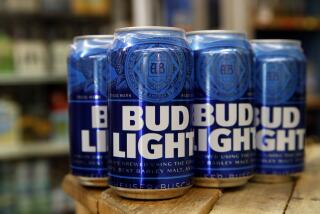Creative force behind 1980s Pepsi ads
Philip B. Dusenberry, one of advertising’s most-celebrated creative executives whose four-decade career included creating lavishly produced Pepsi commercials in the 1980s featuring Michael Jackson and other stars, has died. He was 71.
Dusenberry, who retired in 2002 as chairman of advertising giant BBDO North America and as vice chairman of BBDO Worldwide, died of lung cancer Saturday at his home in Manhattan, the New York City-based agency said in a statement.
Named one of the 100 most influential advertising figures of the 20th century by Advertising Age magazine, Dusenberry created memorable advertising campaigns for such clients as General Electric (“We bring good things to life”), Gillette (“The best a man can get”), Visa (“It’s everywhere you want to be”) and Home Box Office (“It’s not TV. It’s HBO”).
But he may be best known for Pepsi’s “The choice of a new generation” campaign in the ‘80s.
Featuring elaborate productions that rivaled movies or Las Vegas shows, the Pepsi commercials starred celebrities including Lionel Richie, Michael J. Fox, Madonna and, most famously, Jackson, whose hair caught fire in a special effects mishap while shooting one of the spots.
Dusenberry’s work for Pepsi, in particular, has been praised for elevating advertising into the realm of entertainment.
“He does the sort of commercials that you call your wife and kids in from the other room to watch by saying, ‘It’s on again,’ ” John F. Bergin, vice chairman of McCann-Erickson Worldwide, told the New York Times in 1986.
Added Bergin, who was competing with Dusenberry at the time as chief of the Coca-Cola account: “He simply comes up with magic.”
Dusenberry, whose work won countless Clios and other awards, also was known for creating what his agency described as advertising that “touched the heart as well as speaking to the head.”
In one 1985 Pepsi commercial, an unexpected spokeswoman -- Geraldine A. Ferraro, the 1984 Democratic nominee for vice president -- was seen chatting about life with her two daughters.
“There’s one choice I’ll never regret: being a mother,” she told them.
Dusenberry told the New York Times in 1986, “I’m always going to be searching for emotion. In an age when most products aren’t very different, the difference is often in the way people feel about the product.”
Allen Rosenshine, former chairman and chief executive of BBDO Worldwide, said in a news release Monday, “Phil was indeed one of the truly great creative leaders in the history of advertising. He had an unerring instinct for the insight that elevates a good advertising idea to an emotional and human experience.”
As a creative force, Dusenberry’s name extended beyond Madison Avenue.
In 1984, he was a key member of the “Tuesday Team,” which created advertising for President Reagan’s reelection campaign and produced “A New Beginning,” the film that introduced Reagan at the 1984 Republican convention.
Dusenberry also has been described as the “unseen hand” behind the Partnership for a Drug-Free America.
And in the wake of the Sept. 11 terrorist attacks, he led the team that produced the public service campaign the “New York Miracle” to boost spirits and promote New York tourism. The upbeat spots featured prominent New Yorkers, including Barbara Walters singing on Broadway and Yogi Berra conducting an orchestra.
In 2003, Dusenberry was inducted into the American Advertising Federation Hall of Fame -- an honor the avid New York Yankees fan who once dreamed of playing professional baseball described as “the closest an ad guy gets to Cooperstown.”
Dusenberry also had a couple of Hollywood forays: He co-wrote the 1984 screen adaptation of Bernard Malamud’s baseball novel, “The Natural,” starring Robert Redford, and co-wrote the 1973 movie “Hail to the Chief,” a political satire that is also known as “Hail.”
The son of a cab driver, Dusenberry was born in Brooklyn, N.Y., on April 28, 1936. The eldest of six children, he grew up in Flatbush, where he became an accomplished baseball and football player.
He earned a scholarship to Emory & Henry College in Virginia but dropped out after one semester when the school’s athletics department folded and he lost his scholarship.
Returning to New York, he took voice lessons to help eliminate his heavy Brooklyn accent. He was hired as a disc jockey at a small radio station in Abingdon, Va., where he got the first taste of his future career by writing advertising for local merchants.
Dusenberry was a radio DJ on Long Island, N.Y., -- and supplementing his income as the in-store announcer in a department store -- when in 1962 he was offered a job as a junior copywriter at the Batten, Barton, Durstine & Osborn advertising agency. Within a couple of years, he was working on major accounts, including the humorous Gillette Right Guard deodorant commercials in which two men talked to each other through their bathroom medicine cabinets.
In 1965, Dusenberry became the youngest vice president in the agency’s history. He left BBDO in 1969 to form his own agency and returned to BBDO in 1977 as an associate creative director.
At the time, according to a 2002 Advertising Age story, BBDO was “a respected, but mechanical shop.” But upon Dusenberry’s return, “he launched the agency into a creative renaissance.”
Dusenberry became chairman and chief creative officer of BBDO New York in 1986. His memoir, “One Great Insight Is Worth a Thousand Good Ideas,” was published in 2005.
Dusenberry is survived by his wife, Susan; his stepson, Ben Procter; his brothers, Harry and Joseph; and his sister, Jean Driscoll.
--
More to Read
Inside the business of entertainment
The Wide Shot brings you news, analysis and insights on everything from streaming wars to production — and what it all means for the future.
You may occasionally receive promotional content from the Los Angeles Times.










